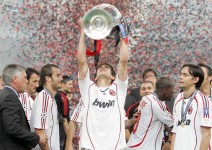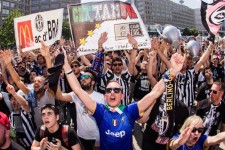
Created by Sporcle
Check out their website for more fascinating quizzes
Follow them on Twitter @sporcle
Like O-Posts on Facebook
You can also follow O-Posts on Twitter @OPosts

Serie A Writer spoke to a Juventus supporter who travelled to Berlin in pursuit of watching his side clinch the treble, read his story below.
As soon as the final whistle blew in Juve’s 3-2 aggregate win over Real Madrid in the Champions League semi-final, I immediately booked a flight to Berlin.
It was my club’s first final in 12 years, I had to be in the city, and I searched for reasonably priced tickets online every day leading up to the final.
There were tickets available but paying north of a grand for 90 minutes of football was not something I was prepared to do.
Myself and two friends, also lifelong Juve fans, travelled to Berlin on the day of the game, full of excitement.
We landed at 9am to beautifully warm weather. After checking into our hotel, we set off hunting for tickets.
Deep down, we still had hope that we could get our hands on tickets - our budget was 500 euros.
The plan of action was to search around the stadium so, after several metro stops, we arrived at Olympiastadion station.
As we walked out of the station, there were around ten people standing by the exit holding up pieces of cardboard that read “Need tickets for UCL final”. Our optimism vanished moments after, but we didn’t give up.
We made our way towards the stadium. It’s an archaic arena but it’s the stadium in which Italy lifted the 2006 World Cup. It obviously has a special place in my heart.
Wandering through the crowd, we came across a guy from Naples after we overheard him speaking to other fans looking to buy.
We approached and asked for his price. Without hesitation, he said: “Two thousand euros.” My friends and I looked at each other in disgust.
So we carried on with our search around the grounds. Tickets were being sold for anything between two and three thousand euros.
I spoke to a couple of Barcelona supporters who flew in from Mexico and had just bought two tickets for six thousand euros. Absurd.
We made our way back to the city for some food and German beer. We had to relax and recuperate for more ticket hunting.
After two hours’ sleep the previous night, it was much needed!
The city centre was scattered with fans wearing the blue-and-red stripes of Barcelona and black-and-white of Juventus.
The Italians were noisier. We joined in the chants:-
“Juve, Ale, Ale, Ale …“
We searched around Alexanderplatz - the city centre - for tickets … but nothing. Fans were even asking us if we had tickets to sell.
At this point, there were just a few hours remaining until kick off. Our focus now turned to making sure we found somewhere good to watch the match on TV.
We were informed by other travelling fans that there was a large sports bar by the stadium, so that’s where we headed.
The sports bar had approximately 1,000 people in it - all drinking beer and eating hot dogs. A pint of beer cost five euros.
Three screens were set up outdoors, the bar was mixed with both sets of fans all getting along, singing and dancing. It was a truly great atmosphere.
The Berlin police reported afterwards that there were no incidents involving fans. That’s just how it should be.
Several beers later, the game got under way. Barcelona scored inside five minutes via an Ivan Rakitic strike. I was effing and blinding in Italian.
And being a few feet away from a group of Barcelona supporters didn’t help matters.
Juve equalised through Alvaro Morata early in the second half. By that point, we were dominating and I genuinely believed that we would go on to lift the trophy.
I won’t report on the rest of the game because, frankly, I want to forget about it.
The Juve defeat did linger but there is no shame in losing to Barcelona.
The rest of the weekend was brilliant, we explored the city. And I can say that it is one of the greatest cities I’ve ever visited.
Grazie Berlin, e fino alla fine Juventus!
Written by Serie A Writer
Follow Serie A Writer on Twitter @SerieAWriter
Like O-Posts on Facebook
You can follow O-Posts on Twitter @OPosts
HEADS UP: Below are the answers to last week’s Champions League crossword puzzle.